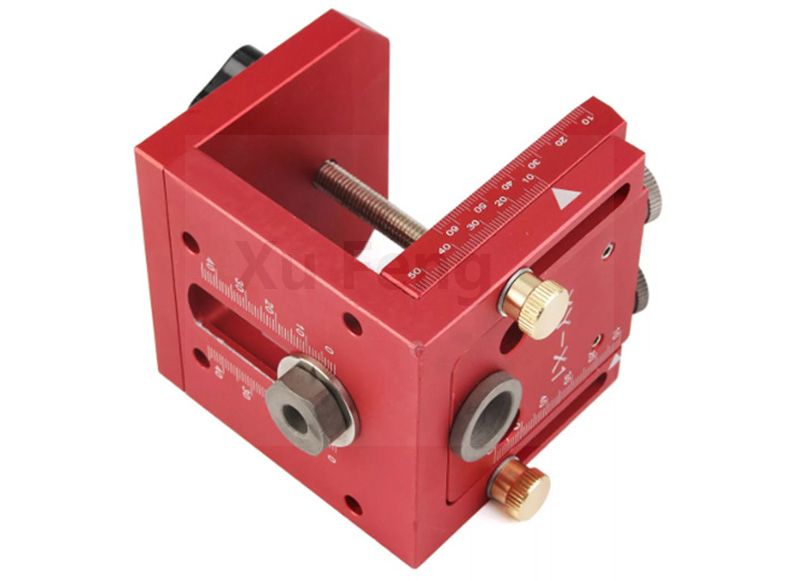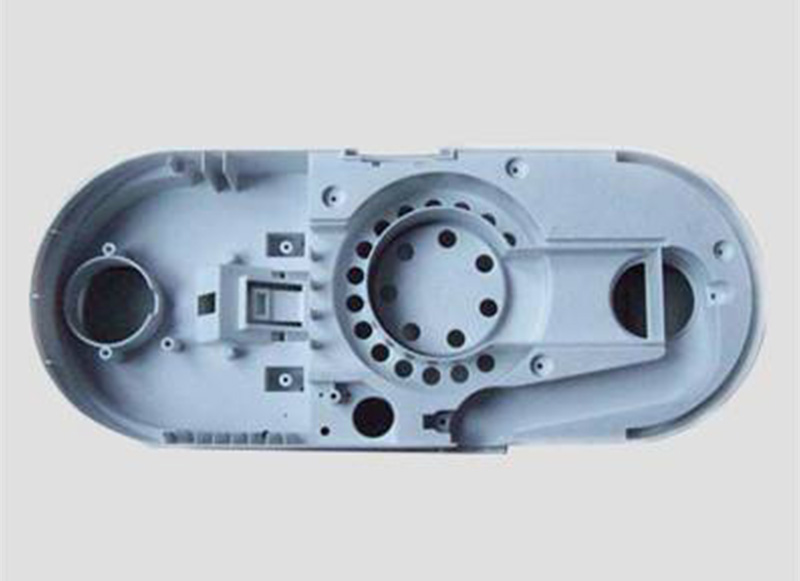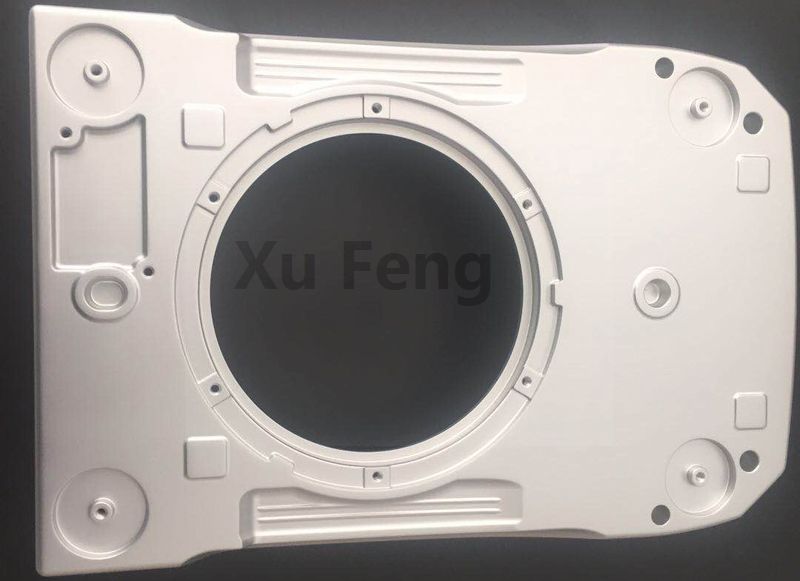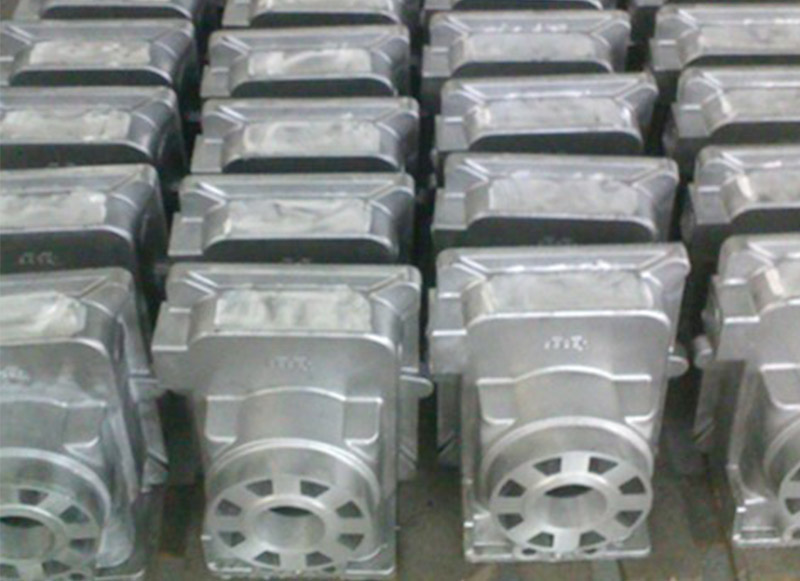 Jun. 12, 2023
Jun. 12, 2023
With the continuous development of modern manufacturing industry, Xufeng custom aluminum milling has gradually become an important branch in the field of industrial processing. It can customize products of different shapes, sizes and materials according to the needs of different customers, and is widely used in aviation, automobile, electronics and other fields.
The main application field of the custom aluminum milling
Custom aluminum milling is used in a variety of industries, including aerospace, automotive, medical, and industrial. It is used to create precision parts and components for a variety of applications, such as engine components, medical implants, and aerospace components. It is also used to create custom parts for a variety of applications, such as custom-designed parts for industrial machinery, custom-designed parts for medical devices, and custom-designed parts for aerospace components.
What is a custom aluminum milling?
Custom aluminum milling is a machining process that uses a rotating cutting tool to remove material from a workpiece in order to create a desired shape or finish. This process is typically used to create complex parts with tight tolerances from aluminum and other metals. The cutting tool is usually a milling cutter, which is a rotary cutting tool with multiple cutting edges. The cutting tool is moved in a linear or rotary motion over the workpiece, removing material as it moves. The cutting tool can be adjusted to create different shapes and sizes, and the speed and depth of the cut can be adjusted to create the desired finish. Custom aluminum milling is often used in the aerospace, automotive, and medical industries, as well as in the production of custom parts for a variety of applications.
Inventor of the custom aluminum milling
The inventor of the custom aluminum milling process is unknown. However, the process itself has been around since the early 1900s. It was first used in the automotive industry to create custom parts for cars. Since then, it has been used in a variety of industries, including aerospace, medical, and industrial.
Why do we need custom aluminum milling?
Custom aluminum milling is necessary for creating parts and components that are specific to a particular application. It allows for the creation of parts that are tailored to the exact specifications of the customer, which can be beneficial for a variety of reasons. Custom aluminum milling can be used to create parts that are lighter, stronger, and more precise than those created with traditional machining methods. It can also be used to create parts with complex shapes and intricate details that would be difficult to achieve with other methods.
History of custom aluminum milling development
The history of custom aluminum milling dates back to the early 20th century. In the early 1900s, aluminum was first used in the production of aircraft components. This was due to its light weight and strength. As the demand for aluminum increased, so did the need for custom aluminum milling.
In the 1920s, the first custom aluminum milling machines were developed. These machines allowed for the production of complex parts with precise tolerances. This allowed for the production of parts that could not be produced with traditional machining methods.
In the 1950s, the development of computer numerical control (CNC) machines revolutionized the custom aluminum milling industry. CNC machines allowed for the production of parts with even greater precision and accuracy. This allowed for the production of parts with complex shapes and intricate details.
Today, custom aluminum milling is used in a variety of industries, from aerospace to automotive. It is used to produce parts for a variety of applications, from medical devices to consumer electronics. Custom aluminum milling is an essential part of modern manufacturing and will continue to be used for years to come.
The development trend of the custom aluminum milling industry
The custom aluminum milling industry is expected to experience significant growth in the coming years. This is due to the increasing demand for custom aluminum parts in a variety of industries, such as aerospace, automotive, and medical. As the demand for custom aluminum parts increases, so too will the need for custom aluminum milling services.
The custom aluminum milling industry is expected to benefit from advances in technology, such as the development of more efficient and precise CNC machines. This will allow for faster and more accurate production of custom aluminum parts. Additionally, the development of new materials and alloys will also help to drive the growth of the custom aluminum milling industry.
The custom aluminum milling industry is also expected to benefit from the increasing demand for 3D printing services. 3D printing is becoming increasingly popular in the manufacturing industry, and custom aluminum parts can be produced quickly and accurately using 3D printing technology. This will help to drive the growth of the custom aluminum milling industry.
Finally, the custom aluminum milling industry is expected to benefit from the increasing demand for sustainable and eco-friendly materials. Aluminum is a highly recyclable material, and its use in custom aluminum parts can help to reduce the environmental impact of manufacturing. This will help to drive the growth of the custom aluminum milling industry.

What are the classifications of custom aluminum milling?
1. CNC Milling: This type of milling uses computer numerical control (CNC) machines to cut aluminum into complex shapes and sizes.
2. Manual Milling: This type of milling uses manual tools such as drills, lathes, and milling machines to cut aluminum into simple shapes and sizes.
3. Waterjet Milling: This type of milling uses a high-pressure stream of water to cut aluminum into complex shapes and sizes.
4. Laser Milling: This type of milling uses a laser beam to cut aluminum into complex shapes and sizes.
5. EDM Milling: This type of milling uses electrical discharge machining (EDM) to cut aluminum into complex shapes and sizes.
When did humans start using custom aluminum milling?
The use of custom aluminum milling dates back to the early 1900s. It was used in the production of aircraft and other industrial applications.
What material is suitable for custom aluminum milling
Aluminum is a popular material for custom milling because it is lightweight, durable, and corrosion-resistant. It is also easy to machine and can be machined to tight tolerances. Other materials that are suitable for custom aluminum milling include brass, stainless steel, and titanium.
How to choose the custom aluminum milling manufacturer with the best quality?
1. Research the company’s reputation: Check online reviews and customer feedback to get an idea of the company’s reputation.
2. Ask for references: Ask the company for references from previous customers.
3. Check the company’s experience: Make sure the company has experience in aluminum milling.
4. Ask for a quote: Ask for a quote from the company and compare it to other quotes.
5. Check the quality of the materials: Ask for samples of the materials the company uses and inspect them for quality.
6. Ask about the turnaround time: Ask the company how long it will take to complete the job.
7. Ask about the warranty: Ask the company what kind of warranty they offer on their work.
What products can custom aluminum milling manufacturers produce?
Custom aluminum milling manufacturers can produce a wide variety of products, including aluminum extrusions, machined parts, castings, forgings, and more. They can also produce custom parts and components to meet specific customer requirements. Common products include aluminum plates, bars, tubes, angles, channels, and other shapes.
How can custom aluminum milling manufacturers improve production quality?
1. Invest in high-quality machinery and tools: Investing in high-quality machinery and tools is essential for custom aluminum milling manufacturers to produce quality products. High-quality machinery and tools will help ensure that the products are machined accurately and efficiently.
2. Utilize quality control measures: Quality control measures should be implemented to ensure that the products meet the customer’s specifications. Quality control measures should include inspections, testing, and documentation of the production process.
3. Train employees: Training employees on the proper use of machinery and tools is essential for custom aluminum milling manufacturers to produce quality products. Employees should be trained on the proper use of machinery and tools, as well as safety protocols.
4. Implement a preventive maintenance program: Implementing a preventive maintenance program is essential for custom aluminum milling manufacturers to ensure that the machinery and tools are in good working condition. This will help reduce the risk of breakdowns and ensure that the products are machined accurately and efficiently.
5. Utilize the latest technology: Utilizing the latest technology is essential for custom aluminum milling manufacturers to produce quality products. The latest technology can help improve the accuracy and efficiency of the production process.
What are the specific requirements of custom aluminum milling manufacturer?
1. Ability to produce custom aluminum parts to exact specifications.
2. Ability to work with a variety of aluminum alloys.
3. Knowledge of machining processes and techniques for aluminum milling.
4. Ability to use CAD/CAM software to create detailed drawings and CNC programs.
5. Ability to use precision measuring tools to ensure accuracy of parts.
6. Ability to provide quality assurance and inspection services.
7. Ability to provide timely delivery of parts.
8. Ability to provide competitive pricing.
What production equipment do custom aluminum milling manufacturer need?
Custom aluminum milling manufacturers typically need a variety of production equipment, including CNC milling machines, lathes, saws, grinders, and other machining tools. They may also need specialized equipment such as EDM machines, laser cutters, and waterjet cutters. Additionally, they may need ancillary equipment such as deburring machines, sanders, and polishers.
Analysis on the layout of custom aluminum milling manufacturer in China's industrial chain
The layout of custom aluminum milling manufacturers in China's industrial chain is an important factor in the development of the industry. The layout of custom aluminum milling manufacturers in China's industrial chain is mainly divided into three parts: upstream, midstream and downstream.
Upstream: The upstream of the custom aluminum milling industry chain is mainly composed of aluminum ingot suppliers, aluminum alloy suppliers, and aluminum processing equipment suppliers. These suppliers provide raw materials and equipment for the custom aluminum milling industry.
Midstream: The midstream of the custom aluminum milling industry chain is mainly composed of custom aluminum milling manufacturers. These manufacturers are responsible for the production of custom aluminum milling products.
Downstream: The downstream of the custom aluminum milling industry chain is mainly composed of custom aluminum milling product users. These users are mainly engaged in the production of aluminum products, such as aluminum doors and windows, aluminum curtain walls, aluminum furniture, etc.
In conclusion, the layout of custom aluminum milling manufacturers in China's industrial chain is an important factor in the development of the industry. The upstream, midstream and downstream of the industry chain are closely related and need to be coordinated to ensure the smooth development of the industry.
What is the maintenance content of the custom aluminum milling manufacturer's production equipment?
1. Regularly check the lubrication of the equipment and add lubricating oil in time.
2. Regularly check the wear of the parts and replace them in time.
3. Regularly check the tightness of the screws and tighten them in time.
4. Regularly check the temperature of the equipment and adjust it in time.
5. Regularly check the electrical system and adjust it in time.
6. Regularly clean the equipment and keep it clean.
7. Regularly check the operation of the equipment and adjust it in time.
Production scale and production capacity of custom aluminum milling manufacturer
The production scale and capacity of a custom aluminum milling manufacturer will depend on the size of the company, the type of equipment they have, and the number of orders they are able to fulfill. Generally, larger companies will have larger production scales and capacities, while smaller companies may have more limited production scales and capacities. The production capacity of a custom aluminum milling manufacturer will also depend on the complexity of the parts they are producing, as well as the number of orders they are able to fulfill.
custom aluminum milling manufacturer produce equipment, how to improve equipment management efficiency
1. Establish a comprehensive equipment management system: Establish a comprehensive equipment management system to ensure that all equipment is properly maintained and operated. This system should include a detailed inventory of all equipment, a maintenance schedule, and a system for tracking and recording maintenance and repair activities.
2. Implement preventive maintenance: Implement a preventive maintenance program to ensure that all equipment is regularly inspected and serviced. This will help to reduce the risk of breakdowns and extend the life of the equipment.
3. Utilize technology: Utilize technology to automate and streamline the equipment management process. This can include using software to track and record maintenance and repair activities, as well as using sensors to monitor equipment performance.
4. Train personnel: Train personnel on the proper use and maintenance of the equipment. This will help to ensure that the equipment is used correctly and that any potential problems are identified and addressed quickly.
5. Monitor performance: Monitor the performance of the equipment to identify any potential problems or areas for improvement. This can include tracking the number of hours the equipment is used, the number of repairs, and the cost of repairs.
Advantages and development direction of custom aluminum milling manufacturers
1. Custom aluminum milling manufacturers have the advantages of high precision, high efficiency, low cost, and good surface quality.
2. The development direction of custom aluminum milling manufacturers is to continuously improve the accuracy and efficiency of machining, and to reduce the cost of machining.
3. The development direction of custom aluminum milling manufacturers is to continuously improve the automation level of machining, and to realize unmanned operation.
4. The development direction of custom aluminum milling manufacturers is to continuously improve the machining accuracy and surface quality of parts, and to reduce the machining time.
5. The development direction of custom aluminum milling manufacturers is to continuously improve the machining accuracy and surface quality of parts, and to reduce the machining time.
6. The development direction of custom aluminum milling manufacturers is to continuously improve the machining accuracy and surface quality of parts, and to reduce the machining time.
7. The development direction of custom aluminum milling manufacturers is to continuously improve the machining accuracy and surface quality of parts, and to reduce the machining time.
8. The development direction of custom aluminum milling manufacturers is to continuously improve the machining accuracy and surface quality of parts, and to reduce the machining time.
9. The development direction of custom aluminum milling manufacturers is to continuously improve the machining accuracy and surface quality of parts, and to reduce the machining time.
10. The development direction of custom aluminum milling manufacturers is to continuously improve the machining accuracy and surface quality of parts, and to reduce the machining time.
Analysis of R&D capabilities of global custom aluminum milling manufacturer
Custom aluminum milling is a process used to create custom parts and components from aluminum. It is a highly specialized process that requires a great deal of expertise and experience. As such, it is important for a global custom aluminum milling manufacturer to have a strong research and development (R&D) capability in order to stay competitive in the market.
The first step in analyzing the R&D capabilities of a global custom aluminum milling manufacturer is to assess the company’s current R&D capabilities. This can be done by looking at the company’s current product offerings, the types of research and development projects they are currently undertaking, and the resources they have available for R&D. This will give an indication of the company’s current capabilities and how they compare to other manufacturers in the industry.
The next step is to look at the company’s future R&D plans. This can be done by looking at the company’s strategic plans and goals, as well as any new projects they are planning to undertake. This will give an indication of the company’s future R&D capabilities and how they plan to stay competitive in the market.
Finally, it is important to look at the company’s overall R&D budget. This will give an indication of the company’s commitment to R&D and how much they are willing to invest in order to stay competitive. It is also important to look at the company’s R&D processes and procedures to ensure that they are efficient and effective.
By analyzing the R&D capabilities of a global custom aluminum milling manufacturer, it is possible to gain an understanding of the company’s current and future capabilities and how they compare to other manufacturers in the industry. This can help to identify areas where the company can improve and become more competitive.
Matters needing attention in the development of raw material supply chain for custom aluminum milling manufacturer
1. Establish a reliable raw material supply chain: It is important to establish a reliable raw material supply chain for custom aluminum milling manufacturer. This includes finding reliable suppliers, negotiating favorable terms, and ensuring that the raw materials are of high quality and delivered on time.
2. Monitor the market: It is important to monitor the market for changes in raw material prices and availability. This will help the custom aluminum milling manufacturer to adjust their pricing and production plans accordingly.
3. Develop a risk management plan: It is important to develop a risk management plan to mitigate the risks associated with raw material supply chain. This includes developing contingency plans in case of supply disruptions, and ensuring that the raw materials are of high quality and delivered on time.
4. Invest in technology: Investing in technology can help the custom aluminum milling manufacturer to streamline their supply chain and reduce costs. This includes investing in automation, inventory management systems, and other technologies that can help to improve efficiency and reduce costs.
5. Develop relationships with suppliers: Developing relationships with suppliers is important for custom aluminum milling manufacturer. This includes negotiating favorable terms, ensuring that the raw materials are of high quality and delivered on time, and building trust with suppliers.
Instructions for cooperation with custom aluminum milling manufacturer
1. Provide detailed drawings: Before cooperating with a custom aluminum milling manufacturer, you should provide detailed drawings of the product you need. This will help the manufacturer understand your requirements and provide you with the best solution.
2. Specify the material: You should also specify the material you need for the product. This will help the manufacturer to choose the right material for your product.
3. Specify the surface treatment: You should also specify the surface treatment you need for the product. This will help the manufacturer to choose the right surface treatment for your product.
4. Specify the quantity: You should also specify the quantity of the product you need. This will help the manufacturer to provide you with the best price.
5. Specify the delivery time: You should also specify the delivery time for the product. This will help the manufacturer to provide you with the best delivery time.
6. Provide feedback: After receiving the product, you should provide feedback to the manufacturer. This will help the manufacturer to improve their services and provide you with better products in the future.
 Previous: Rapid Prototype Aluminum Parts
Previous: Rapid Prototype Aluminum Parts
 Next: cnc milling aluminum
Next: cnc milling aluminum